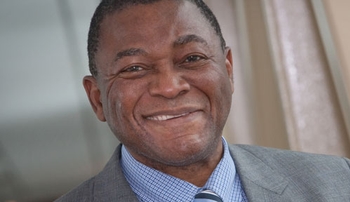When Dele Davies, M.D., vice chancellor for academic affairs, invited faculty members to submit proposals for the development of e-learning modules and courses that could be used with “flipped classrooms,” no one expected dozens of applications.
The courses, to be used as part of UNMC’s key e-learning strategic initiative, would require not only a passion for education and a time commitment to create, but also a commitment to excellence and innovative teaching that addresses current gaps with creative learning approaches.
UNMC’s educators responded with enthusiasm.
“UNMC has a long tradition of excellence in the training of our students,” Dr. Davies said. “We have a groundswell of interest in examining new teaching methods that combine online learning modules with classrooms that are freed up for critical thinking, team building and problem solving exercises. This interest underscores the ingenuity and creativity of our faculty members, staff and students.”
See sidebar for new e-learning opportunities
The surge of interest and the stellar proposals bode well for UNMC’s current and future status as a national and international leader in teaching innovations, Dr. Davies said.
“These courses should be an excellent foundation for building our vision of a premier health sciences e-learning center on campus,” he said.
|
The development of each e-learning course and module represents a collaborative effort of several units or colleges. Many projects are also designed for use by more than one college. The following project directors are leading e-learning innovation at UNMC:
Funded E-learning courses:
College of Medicine
- Sara Bares, M.D./Uriel Sandkovsky, M.D., “Clinical Management of HIV Infection.”
- Carrie Elzie, Ph.D./Ryan Splittgerber, Ph.D., “CALM: Clinical Anatomy Learning Modules.”
- Charity Evans, M.D., “Medical Education in Medical Ventilation.”
College of Public Health
- Denise Britigan, Ph.D., “Health Literacy for Health Professionals.”
Funded E-learning modules:
College of Nursing
- Teresa Barry Hultquist, Ph.D., “Employee Satisfaction: A Leader’s Challenge.”
- Sara Brown, Ed.D., “Productive Partnerships Through Community Engagement.”
- Connie Miller, Ph.D., “Invasive Pressure Monitoring: Arterial and Intracranial Pressure.”
College of Medicine
- James Harper, M.D., “Coagulation Problems.”
- Subodh Lele, M.D., “Diagnosis of Renal Neoplasms.”
- Jyoti Mahapatra, M.D., “Introduction to the Trauma Patient.”
- Maheswari Mukherjee, Ph.D., “Fine Needle Aspiration Technique.”
- Christopher Smith, M.D./David Gannon, M.D., “Advanced Clinical Skills Team.”
- Jim McClay, M.D., “Introduction to Biomedical Informatics.”
- James O’Dell, M.D., “Gout: Driving to Better Understanding and Management.”
College of Pharmacy
- Ally Dering-Anderson, Pharm.D., “OTC and Self Care Topics: Incontinence, Sleep, Cough and Cold.”
School of Allied Health Professions
- Joseph Driewer, Ph.D., “Particle Toss: The Physics of Radiation Interactions With Matter.”
College of Public Health/College of Pharmacy
- Kendra Schmid, Ph.D./Gary Yee, Pharm.D., “Biostatistics Primer.”
McGoogan Library of Medicine
- Heather Brown/Alissa Fial, “Searching the Library for Evidence.”
Graduate College
- Andrew Dudley, Ph.D./Karen Gould, Ph.D., “Grant Writing: Theory and Practice.”
